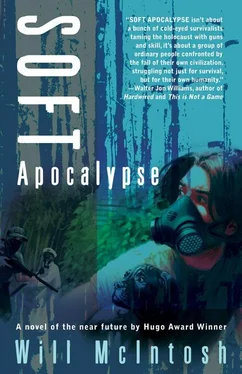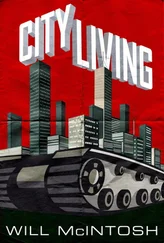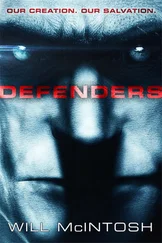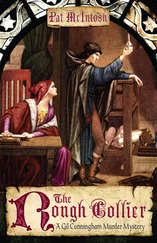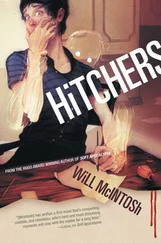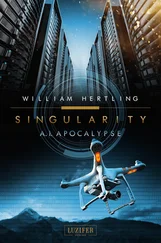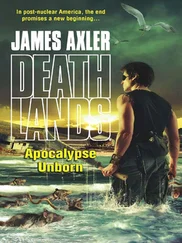She did. “Jasper, thank you for thinking of me,” she said before she hung up. I called Cortez. He promised to get her out. He told me not to worry. I fought back tears, glad I’d called Sophia.
“There they are!” Jeannie said, pointing. Up ahead, Sebastian was sitting on the rail. He shimmered a little in the afternoon heat.
When Sebastian spotted us he ran to meet us, laughing, his arms spread for hugs. “Look, a little good luck.” He pointed ahead. Good luck, indeed. We were near the perimeter of Savannah’s rhizome barrier—ahead of us lay a wall of bamboo, broken only by scattered pines. But a train had been through recently, slicing away the bamboo that had grown in the tracks. As I watched, a dozen people hurried up a ridge from the roadway and fled along the tracks. We would make good time as long as the trains kept running. They’d better keep running—they were the only transport in and out of Savannah.
“Where are we going?” I asked no one in particular.
“We should head to Athens,” Sebastian said. “They’re establishing a communal setup there—cutting edge, very cool. Most of the smaller towns are grown over, and all the cities are going to end up like Savannah if they haven’t already.”
“This all part of the master plan?” I asked.
“We are the master plan, Jasper,” Sebastian said, clapping my back and giggling. The Zen virus bastard always had a koan ready.
“I always wanted to be a master plan,” Colin said.
“Remember what they taught us in fifth grade?” Sebastian said, holding up a finger. “We can be anything we want, if we work hard enough and believe in ourselves.”
“They really taught us that horseshit, didn’t they?” Ange said.
“Hold on,” I said, still looking at Sebastian. “I really want to know: did you expect the bamboo to spread like this?”
He chuckled. “No. No one expected this. But nothing works exactly the way you planned, and it’s still probably better than the alternative.” Sebastian started walking toward the tracks, and the rest of us followed.
“What exactly was the alternative?” Jeannie asked.
“World war. Countries will always choose war over starvation if forced to choose.”
He made it sound like he and his egghead friends had a crystal ball. The bamboo screw-up made it clear that they didn’t know half as much as they thought they did. It hadn’t slipped past me that for the first time Sebastian had inserted the word “probably” into his claim that the bamboo was helping rather than hurting.
“That’s all well and good,” I said, “but is anyone planning to fix the royal fuck-up that this bamboo has turned into?” I asked.
“People are working on it. It’s a tough problem, though—the bamboo is engineered to be resistant to herbicides, and even if you can design an effective herbicide, the root systems are engineered to disconnect after a time, so you can only kill a tiny cluster at a time.”
“Wow, look at that girl run!” Colin said, pointing.
Deirdre was sprinting toward us with her head down. Dread, and a little lust, washed over me at the sight of her. She glanced up, spotted us, and immediately slowed to an easy walk. She was wearing plain old shorts and a t-shirt. It was so un-Deirdre-like to see her dressed down. There were more people on the tracks behind her—more refugees fleeing the chaos. We wouldn’t be lonely.
By the time Deirdre reached us she wasn’t even breathing hard.
“So let’s get the fuck out of here,” she said by way of greeting, and walked right past us. We hoisted our packs.
Deirdre. Sophia. It was as if my past was collapsing in on me.
“I’d forgotten how charming she was,” Colin said as we followed her into the narrow tunnel cut in the bamboo. “I don’t understand why you broke up with her.”
Walking on train tracks is a pain in the ass. The gravel in between the railroad ties is rough and uneven, and the nubs of the cut bamboo didn’t help, so your instinct was to walk on the ties. But they’re never evenly spaced, so you’re constantly adjusting the length of your steps. Every so often I would resolve to ignore the ties, pick up my head and just walk, but my gaze kept drifting down, hypnotized by the ties underfoot, and I’d find myself stutter-stepping again.
Within an hour we hit patches where the bamboo was growing back through the tracks, and that added to the challenge. And then there were the insects—sand gnats buzzing in my eyes and ears, little dragon mosquitoes biting my ankles.
“Anybody have insect repellant?” I asked.
“I do,” Sebastian said, reaching to pull his pack off without slowing. But Deirdre beat him to it, tossing a tube over her head without turning. It landed on the tracks in front of Jeannie, who retrieved it, squeezed a blob for herself, and passed it on to me.
“Thanks,” I said. No answer.
For once, I realized it wasn’t hard to understand what Deirdre was feeling. She resented having to ask me for help. She didn’t like asking anyone for help, and our history made it worse. But at the same time, she felt she owed me. So she hated me and felt grateful at the same time.
We hit a steep bend, and suddenly there was Cortez, lounging in the middle of the tracks, his back propped on an enormous pack.
“Ladies. Gentlemen,” Cortez said.
Everyone shouted out and hurried to greet him. More hugs ensued.
“Is Sophia out?” I asked Cortez as I hugged him.
“She’s underground. We’re meeting them about five miles ahead.”
“Hey, I know you,” Deirdre said.
“I worked for you five, six years ago,” Cortez said, shaking her hand. “Good to see you again.”
Deirdre looked off toward the tops of the pine trees. “Shall we onward?” she said. She squeezed past Cortez and walked on. The rest of us followed.
“So what are all those federal troops doing in the city?” I asked Sebastian, since he seemed to know everything.
“The feds are trying to retain control of the country. Remember last year when all U.S. troops were called home from overseas, after Lake Superior was nuked? That was the first step. The fed has decided we’re at the tipping point, and drastic measures need to be taken to keep us from slipping into chaos.”
“To keep us from slipping into chaos?” Cortez said. “I think that ship has already sailed.”
Sebastian gave him a little grunt of a laugh. “You ain’t seen nothing yet.”
I didn’t like the sound of that at all.
“To your left! Your left!” Cortez called to a ragged group ahead of us. A woman carrying a crying baby glanced back, called out to her group in Spanish. They drifted to the right, letting us pass. The tracks allowed us to walk two abreast, but no more; we had to go single-file when we passed someone.
“Speaking of chaos, did anyone hear about what happened in New York City on Thanksgiving?” Cortez asked.
“What?” Ange said.
“Word spread that the parade down Fifth Avenue was going on, for the first time in six, seven years. Thousands of people showed up—moms brought their kids to show them the big floats, everyone was feeling a little hope, a little lift that things were getting better.”
Cortez bit at one of his fingernails, spit the sliver out. “Then the parade comes. The floats were awful nightmare things, the marchers covered in blood. Some guy was walking holding up a dog’s head with the eyes gouged out. Kids were crying and screaming. The Jumpy-Jumps had put the whole thing together.”
“I don’t believe that,” Colin said .“It sounds like an urban myth. It’s got to be or we would’ve heard about it on TV or the radio.”
“Maybe, but how much of this shit do you think they’re still putting on the air?” Cortez said. “That just helps the Jumpy-Jumps.”
Читать дальше
